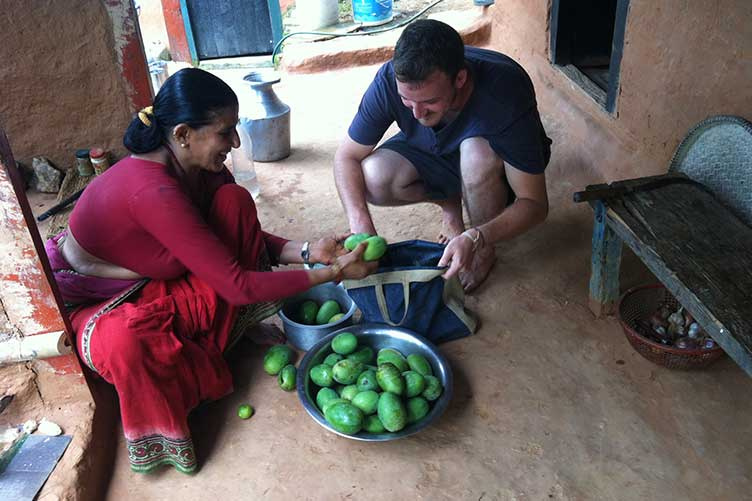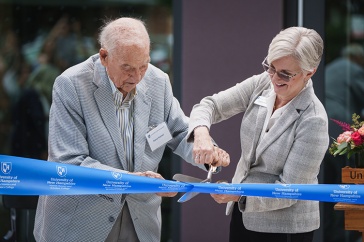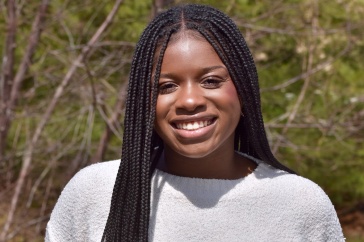

The Arghakhanchi District of Nepal is a mountainous region west of Kathmandu that is covered with fields of corn and rice as well as lush, forested valleys.
“It’s probably the most beautiful place I’ve ever seen,” says Andrew Phinney, a 2014 UNH graduate who is stationed there on a 27-month stint as a food security volunteer for the Peace Corps.
The Corps has been on Phinney’s mind since high school, and his decision to join was sealed during a summer trip to Uganda as a UNH medical microbiology student, where he worked on a six-person public health team that trained people living in rural areas on safe water, sanitation, malaria prevention, family planning and HIV/AIDS testing, prevention and treatment. “After that, (the Corps) became part of my plan,” Phinney says.
His plan had starts and stops. Phinney joined the Corps and arrived in Nepal two months before the April 2015 earthquake that killed more than 8,000 people and injured tens of thousands of others in that country. He was in Kathmandu for training with his fellow volunteers when the quake struck.
“We were right in the city. I was in a coffee shop on the second floor. Everything just started to go. It was really, really scary,” Phinney says.
Back in his UNH days, he was a volunteer EMT, and in that moment, his emergency training kicked in.
“The first thing that came to mind whenever I went out on a call as an EMT was to make sure I was safe and the team was safe. That’s exactly what I had to do in Kathmandu.” He got his group together and told them, “'We need to be away from this side of the street in case of an aftershock, because the next time, this building is going to go.’ I took the safety role,” Phinney says.
After that, he and his colleagues stayed at the U.S. Embassy for several days, where he and another volunteer helped the consular keep track of trekkers in the mountains. “Whenever we received information from trekkers, we would relay it to American and Nepali special forces who were heading up rescue efforts for the missing. We were in the right place at the right time,” Phinney says.

They were in the capital for eight days before being evacuated to Thailand, where they debriefed with Peace Corps staff who had flown in from Washington, D.C. The group returned to the U.S. after that, and several weeks passed before it was safe enough for Phinney to return to Nepal. He went back in July 2015 and has just finished his 13th month in Arghakhanchi.
As a food security volunteer, he has a dual focus on nutrition and agriculture.
“I’m working on health literacy, talking with my area's many mothers’ groups about kidney and heart diseases, blood pressure, cancer, first aid and emergency medicine, nutrition and kicking bad habits. People here already know of a lot of different health-related issues, but they don't understand their mechanisms or what having high blood pressure or kidney disease actually means,” Phinney says.
Ambassador Material
As a medical microbiology student in the UNH College of Life Sciences and Agriculture (COLSA), Andrew Phinney ’14 applied for and received a $5,000 Marble Scholarship. Marble Scholars serve as COLSA ambassadors, meeting with prospective UNH students and their parents at open houses and other events for high school students. Phinney says that experience paid off in a big way.
As an intern at the Clinton Foundation during the summer after his UNH graduation, “I had been working on a project, making blunder after blunder and apologizing to my supervisor,” Phinney says. “At one point I asked, ‘Why did you pick me for this?’”
His supervisor pulled out the resume Phinney had sent when he applied for the internship and the two went over it together. “He was serious about making me believe in myself,” Phinney recalls. “He pointed to the Marble Scholarship and said, ‘This put you above other people. This ambassadorship role … that position was what put you above many of your competitors.’”
He’s also teaching residents about fruit tree air layering. “This is a method used to propagate fruit trees. I've been doing this with folks who live around me so that they can exchange cuttings and grow more diverse fruits at their own homes,” he says. This effort aims in part to improve self-reliance among citizen farmers, an important objective because of a political disagreement between Nepal and India that has led to a fuel crisis, making it more expensive to import goods and services.
Phinney has also been helping his host family in their grain fields and vegetable gardens and on coffee production — from tree to cup. “And, yes, the coffee is delicious,” Phinney says.
It is hard work, both mentally and physically. Just getting to meetings, and there have been many for Phinney, means hiking over hilly terrain, and days are filled with the tasks required of living in a remote village with few creature comforts.
But Phinney is not deterred by hard work. As a UNH undergraduate, he worked three part-time jobs in addition to his volunteer gig, and four days after commencement in 2014, he moved to New York City, where he knew no one, to work for the Clinton Foundation as one of 115 summer interns. At the end of the summer, he was one of only three among the interns to be hired as a full-time staff person. He managed the internship program, helping bring on board 160 fall and spring interns and training new staff on how to work with them.
“It was a really cool position,” Phinney says. But when the time came to fulfill his Peace Corps plan, he left the Big Apple and headed east to find himself amid a very different environment in those chaotic days following the earthquake and still today in one of the world’s poorest nations.
On the day we reached him by phone, Phinney was holding two baby goats that he’d helped birth in the moments before the call. Other than surprising moments like that one, he seems to have settled into a fine routine.
“My house faces west, and there are two really beautiful mountains to the west of us. Every day I watch the sun set over them.”

The Charles F. Marble Scholarship Fund was established by Marilynn K. Rumley ’52 in honor of her grandfather, who nurtured her love of learning.
Learn how you can help support UNH students.
Photos courtesy of Andrew Phinney
-
Written By:
Tracey Bentley | Communications and Public Affairs
















































